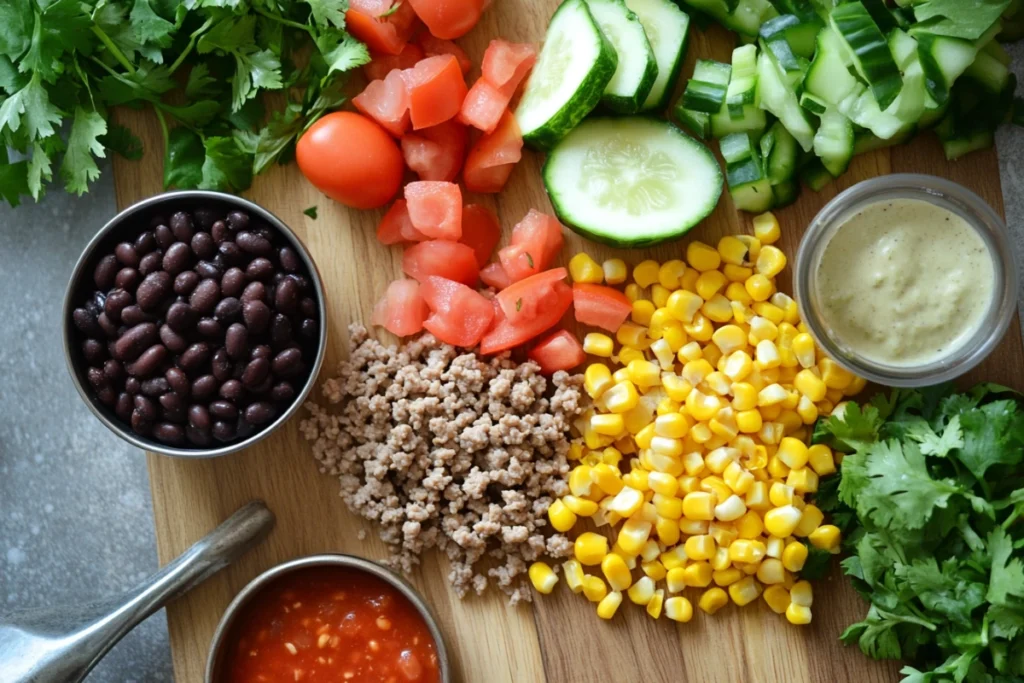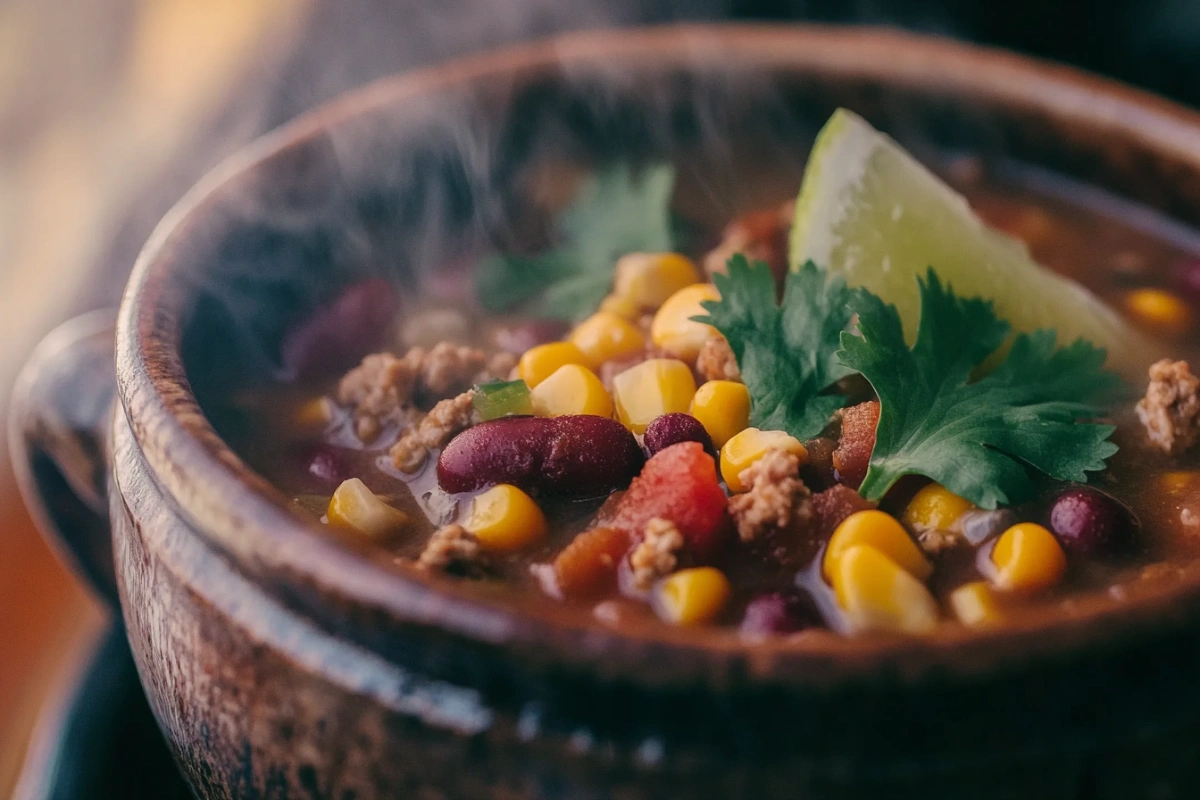Homemade taco soup is a flavorful, comforting dish that’s often enjoyed for its rich, hearty taste and ease of preparation. But have you ever wondered, how many calories is homemade taco soup? Whether you’re watching your calorie intake or just curious about the nutritional content of your favorite meals, understanding the calorie breakdown is essential for maintaining a balanced diet.
This comprehensive guide will walk you through the nutritional content of homemade taco soup, break down the calorie contributions of individual ingredients, and share tips for making a healthier version of this classic comfort food. You’ll also learn how homemade taco soup compares to store-bought alternatives and explore various recipe variations to fit different dietary needs.
Introduction to Homemade Taco Soup
What is Taco Soup?
Taco soup is a Tex-Mex-inspired dish that’s a fusion of a classic taco and a hearty soup. Imagine a warm bowl filled with seasoned ground beef, beans, corn, tomatoes, and spices, all simmered together in a savory broth—it’s comfort food at its finest! Often served with tortilla chips, shredded cheese, and a dollop of sour cream, it’s a crowd-pleaser for family dinners and gatherings alike.
But while delicious, the question remains: how many calories is homemade taco soup? The answer depends on the ingredients used, making it a versatile dish for both high-protein diets and lighter meal plans.
Why is it Popular?
Homemade taco soup has soared in popularity due to its simplicity and customizability. With just a handful of pantry staples, you can whip up a batch in under an hour. Plus, it’s perfect for meal prepping, as the flavors only get better with time.
Additionally, it’s a one-pot wonder, minimizing cleanup while delivering a meal rich in fiber, protein, and healthy fats. Whether you’re craving a cozy winter dish or a healthy comfort food option, taco soup fits the bill.
Up next, we’ll dive deeper into the nutritional breakdown of homemade taco soup to answer the burning question: how many calories is homemade taco soup and how can you calculate it accurately? Stay tuned!
Nutritional Overview of Homemade Taco Soup
Caloric Content
So, how many calories is homemade taco soup? On average, one cup of homemade taco soup contains around 197 calories, but this can vary significantly based on ingredients. The calorie count mainly depends on the choice of protein, beans, and toppings. For example, using lean ground turkey instead of beef can reduce calories while keeping the soup flavorful.
A basic homemade taco soup recipe often includes ground beef, kidney beans, corn, tomatoes, and taco seasoning. Each ingredient contributes differently to the overall calorie count. For instance, a half-cup of corn adds approximately 75 calories, while a cup of kidney beans adds about 110 calories. These variations make it crucial to calculate each ingredient’s contribution.
Macronutrient Breakdown
Beyond calories, understanding macronutrients is essential for a healthy diet. Homemade taco soup offers a balanced mix of protein, fats, and carbohydrates:
- Protein: 18.5g per cup, largely from ground beef and beans, making this a high-protein meal.
- Fat: 5.3g per cup, with most coming from the beef and optional cheese toppings.
- Carbohydrates: 20g per cup, mainly due to beans, corn, and tomatoes, making it fiber-rich.
This balance makes taco soup ideal for muscle recovery and sustained energy, especially when paired with a moderate portion size.
Check out this helpful guide on making thick taco soup for an even heartier version!
Ingredients and Their Calorie Contributions
Protein Sources: Ground Beef, Chicken, Turkey
The choice of protein significantly affects the calorie count.
- 80/20 Ground Beef: About 290 calories per 3 oz serving.
- 93% Lean Ground Turkey: Approximately 170 calories per 3 oz serving.
- Shredded Chicken: Roughly 140 calories per 3 oz serving.
Opting for leaner proteins like turkey or chicken can reduce overall fat content without sacrificing flavor.

Vegetables and Beans
Vegetables and beans not only add bulk but also contribute fiber and nutrients:
- Kidney Beans: 110 calories per cup, rich in fiber and protein.
- Corn Kernels: 75 calories per half-cup, a source of carbs and sweetness.
- Diced Tomatoes: 30 calories per cup, adding volume with minimal calories.
Broths and Sauces
Broths and sauces add liquid and flavor but can vary widely in calories.
- Low-Sodium Chicken Broth: 15 calories per cup.
- Tomato Sauce: 35 calories per half-cup.
- Sour Cream (optional topping): 50 calories per tablespoon.
For a lower-calorie version, consider broth-based soups without heavy cream or cheese. This helps keep taco soup light while still tasting rich.
Looking for more variations? Try this delicious Taco Soup Frios Recipe!
Next, we’ll break down how to calculate calories in homemade taco soup with precision, so stay tuned!
How to Calculate Calories in Homemade Taco Soup
Measuring Ingredients Properly
So, how many calories is homemade taco soup? To get a precise answer, you need to measure each ingredient accurately. The calorie count can vary based on the amount and type of each ingredient. Using measuring cups and kitchen scales ensures you’re getting the most accurate data for your homemade taco soup.
Start by portioning out each ingredient before cooking. For example:
- 1 cup of kidney beans: 110 calories
- 1/2 cup corn kernels: 75 calories
- 1 cup diced tomatoes: 30 calories
- 3 oz lean ground turkey: 170 calories
Add up these calories for a total estimate before cooking. If you’re making a large pot, divide the total calorie count by the number of servings for a per-serving breakdown.
Using a Calorie Tracker
A calorie tracker can be a game-changer for determining how many calories is homemade taco soup. Apps like MyFitnessPal and Cronometer allow you to input each ingredient and portion size, automatically calculating the total calorie count.
Steps to calculate using a tracker:
- Open the app and select “Create a Recipe.”
- Input each ingredient with the measured amounts.
- Set the number of servings for the recipe.
- Review the calculated calorie total per serving.
This method ensures your calorie estimates are both accurate and consistent, especially when adjusting portion sizes or swapping ingredients.
Variations of Taco Soup and Their Calorie Differences
Vegetarian Taco Soup
Looking for a meatless twist? Vegetarian taco soup is not only flavorful but also lower in calories than the meat-based version. This version typically replaces meat with ingredients like:
- Black beans: 114 calories per cup
- Red lentils: 165 calories per cup
- Zucchini or Bell Peppers: 20 calories per cup
The absence of meat significantly reduces fat content while keeping the protein levels balanced, thanks to beans and lentils.
Keto Taco Soup
For those following a low-carb lifestyle, Keto taco soup is a perfect choice. By removing beans and corn while focusing on high-fat ingredients, you can create a satisfying meal with fewer carbs.
Key ingredient swaps for a keto-friendly version:
- Ground beef (80/20): 290 calories per 3 oz
- Heavy cream: 50 calories per tablespoon
- Cauliflower rice: 25 calories per cup
This version focuses on healthy fats and minimal carbs, making it ideal for ketogenic diets while still answering how many calories is homemade taco soup can vary depending on the recipe.
For more delicious soup variations, explore this Taco Soup Frios Recipe for inspiration!
Health Benefits of Homemade Taco Soup
High Protein Content Benefits
Wondering how many calories is homemade taco soup and if it fits a healthy lifestyle? Beyond the calorie count, homemade taco soup is packed with protein, making it a great choice for muscle maintenance and repair. With approximately 18.5g of protein per cup, it supports muscle growth and helps you feel full longer.
Protein is essential for:
- Muscle recovery after workouts
- Boosting metabolism by increasing calorie burn during digestion
- Reducing cravings, helping with weight management
Choosing leaner meats like turkey or chicken further enhances these benefits while keeping the calorie count lower.

Fiber and Digestive Health
Homemade taco soup often includes fiber-rich beans and vegetables, making it excellent for digestive health. A cup can offer around 4.8g of fiber, which contributes to your daily fiber intake goals.
Benefits of fiber in taco soup:
- Improves digestion and prevents constipation
- Regulates blood sugar by slowing sugar absorption
- Promotes fullness, which can aid in weight management
By balancing protein, fiber, and moderate fats, taco soup can be a nutrient-dense meal ideal for both weight loss and muscle maintenance.
Tips for Making a Low-Calorie Taco Soup
Choosing Leaner Proteins
If you’re aiming to lower the calorie count of homemade taco soup, the choice of protein makes a significant difference. Swapping ground beef for:
- Ground turkey (93% lean): 170 calories per 3 oz
- Shredded chicken breast: 140 calories per 3 oz
- Plant-based crumbles: 150 calories per serving
These substitutions help cut down on both calories and saturated fat, keeping the soup lighter but still satisfying.
Reducing Sodium and Sugars
Many taco soup recipes include canned ingredients that can be high in sodium and added sugars. To keep your soup healthy:
- Use low-sodium broth instead of regular broth
- Opt for fresh or no-salt-added tomatoes
- Rinse canned beans thoroughly to reduce sodium content
Additionally, minimizing toppings like sour cream, cheese, and tortilla strips can further reduce the calorie count.
By focusing on fresh ingredients and lean proteins, you can create a nutrient-rich, low-calorie taco soup that’s perfect for a balanced diet.
Curious about how the calorie count varies with different recipes? Stick around for a comparison with store-bought taco soup in the next section!
Comparing Homemade Taco Soup to Store-Bought Versions
Store-Bought Soup Calorie Comparison
If you’re wondering how many calories is homemade taco soup compared to store-bought options, the difference can be significant. A cup of homemade taco soup generally contains around 197 calories per serving, depending on the ingredients used. On the other hand, store-bought taco soups can vary from 250 to 350 calories per cup due to higher fat, sodium, and added preservatives.
Many pre-packaged soups also contain cream-based broths or excessive cheese, which can spike both calorie count and saturated fat content. Ingredients like processed meat and refined starches further increase calorie density while reducing nutritional value.
Nutritional Content (Per 100g)
If you’re curious about how many calories is homemade taco soup in detail, here’s a nutritional breakdown per 100g:
| Nutrient | Amount (Per 100g) |
|---|---|
| Calories | 81 kcal |
| Protein | 7.6g |
| Fat | 2.2g |
| Saturated Fat | 0.7g |
| Carbohydrates | 8.2g |
| Fiber | 1.9g |
| Sodium | 160mg |
Benefits of Homemade Preparation
Making taco soup from scratch offers more control over calories and nutritional value. Homemade versions let you:
- Choose leaner proteins (like ground turkey instead of beef)
- Use low-sodium broths for better heart health
- Skip preservatives and artificial flavorings
- Add more vegetables for extra fiber and vitamins
Plus, you can adjust portion sizes and control toppings, like sour cream or shredded cheese, which can quickly increase calorie count.
If you’re aiming for a healthy diet, homemade taco soup stands out as the smarter choice since you control every ingredient.
Common Mistakes Affecting Calorie Count
Adding High-Calorie Toppings
Even if you make the soup from scratch, toppings can significantly impact how many calories is homemade taco soup. While toppings enhance flavor, they often add unnecessary fats and sugars.
Consider these calorie comparisons for common taco soup toppings:
- Sour cream (2 tbsp): 120 calories
- Shredded cheddar cheese (1/4 cup): 110 calories
- Tortilla strips (1 oz): 140 calories
A bowl with all three can easily exceed 500 calories, making it feel more like a cheat meal than a healthy dish.
Using Processed Ingredients
Another mistake that affects the calorie count is using processed ingredients. Canned products, especially those with added sugars or sodium, can significantly raise calorie content.
To keep it healthy:
- Choose low-sodium beans and rinse them thoroughly.
- Opt for fresh corn instead of canned corn with added sugar.
- Use homemade taco seasoning instead of prepackaged mixes high in salt and additives.
By focusing on fresh, whole ingredients, you can keep your taco soup lower in calories while still packed with flavor and nutrition.
Up next: Learn the most common FAQs about taco soup and its calorie count!

